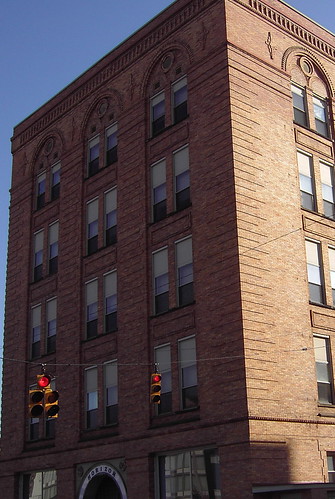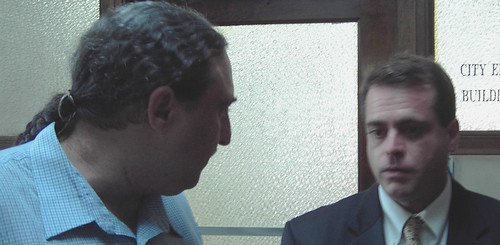Native American Russell Cooper, who tried to run for Portsmouth City Council last year, was accused of being a forger. As a result of the City Clerk’s and the City Solicitor’s investigations, Cooper was charged with having forged signatures on his election petitions.
The forgery charges against Cooper have since been dropped, as veterans in the reform movement had predicted they would be once they had served their political purpose, which was to prevent Cooper from effectively challenging David Malone for the Ward 2 council seat in a special recall election. Viewed as hypocritical and incompetent by a number of voters in his ward, Malone, the “praying councilman,” was perhaps the member most vulnerable to recall. The rush to judgment on the part of City Clerk Aeh and City Solicitor David Kuhn on Cooper’s alleged forgeries had the effect of keeping a rubber-stamp incumbent, David Malone, on the city council and a reform candidate, Cooper, off.
I have copies of Cooper’s petitions and I can see that there are questionable signatures on them, but since several of those whose signatures were allegedly forged had extensive criminal records, to immediately assume that it was Cooper who was responsible for the alleged forgeries was a convenient way to scuttle his candidacy. Cooper had no trouble finding enough Ward 2 voters willing to sign his petition, so why would he have forged signatures? It does not make sense. Where is the motivation?
Cooper (left) with lawyer as he faced charges of forgery
I believe there is a double standard in
In addition to having copies of Cooper’s disputed election petitions, I also have in my possession a photocopy of an older document that could serve as a classic example of the double standard that exists in
Fowler Building It has been known for years by friends of the woman that the marriage in question never took place, and that the woman in question had been impregnated by Fowler, a member of an old and prominent
It has been known for years by friends of the woman that the marriage in question never took place, and that the woman in question had been impregnated by Fowler, a member of an old and prominent
The broader implications of the unusual marriage license are worth noting. Probate records are what make civil society possible. Our legal identity, who we are as citizens, depends upon such records. The family, on which society as we know it depends, needs to keep clear who is a father and mother and who is a son and daughter. Without those family distinctions remaining clear and without probate records to prove their accuracy, we could end up singing, in the words of a comic song, “I’m my own grandpa.” How could a judge charged with the responsibility for assuring the integrity of probate records have anything to do with the criminal falsification of even one of those records? We don’t expect a fire chief to burn a church down or a lifeguard to drown someone. How could a family man and pillar of the community, how could a member of the Wesley Methodist Church and the distinguished president of the National Judges Association, how could a former member of the Ohio state legislature and an assistant attorney general of Ohio, how could a respected person in a position of public trust have dared to be party to an act that at the very least would have scandalized his family and ruined his career, and probably have resulted in some kind of jail time? I heard Newt Gingrich, of all people, recently say on TV, in a discussion of the Abramoff scandal, in which Ohio congressman Ney is implicated, that public officials who betray their public trust should be shown no mercy.
I have spent a several years trying to figure out the answer to why Judge Fowler did what he apparently did. Some of those who knew him thought he was eccentric, but no one considered him crazy. So the only answer I can come up with is that he dared to do what he did because the over-privileged of Portsmouth, the people in positions of authority, have been getting away with so much for so long that they are conditioned to think they are above the law. After all, who was going to look into the matter, even if they heard rumors of Fowler's waywardness? Who was going to go poking around in probate records? The city or county prosecutor? A reporter for the Portsmouth Daily Times? Fat chance.
A fire chief is in the best situation to get away with arson and a probate judge to falsify probate records, but if there is a pregnant woman in the picture any advantages the fire chief or judge has are more than outweighed by the desperateness of his situation. The original marriage license, on file at the county courthouse, is so obviously a frantic whited-out cut-and-paste document that it resembles a ransom note as much as a marriage license. It would not have taken a Sherlock Holmes or a Woodward and Bernstein to conclude there was something very suspicious about it. The marriage certificate indicates forgery far more than do Russ Cooper’s election petitions do, but Cooper is not one of Portsmouth's over-privileged, and that makes all the difference.
I would not have written about an old marriage license and exhumed this matter if it did not have direct relevance to the central theme of River Vices, which is the outrageous but long-running abuse of power on the part of the over-privileged of
There is something feudal about social relations in
 I regret that in this blog I may be toppling a departed pillar of the community, just as a bulldozer last November toppled the tower of the Wesley Methodist Church, which Fowler, ironically, belonged to. But I am not doing it just to make room for another parking lot. I am doing it to make way for a truth, unfortunately an unpleasant truth, and that is that even one of the most respected and trusted of Portsmouth's over-privileged could not resist the temptation of thinking he was a law unto himself. And if that is what a "gentleman and a scholar" dared to do, it is even worse now with some of the unscrupulous characters who are in positions of authority and influence in our community, characters who have been screwing the public so long they think it is their birthright, like the droit du seigner.
I regret that in this blog I may be toppling a departed pillar of the community, just as a bulldozer last November toppled the tower of the Wesley Methodist Church, which Fowler, ironically, belonged to. But I am not doing it just to make room for another parking lot. I am doing it to make way for a truth, unfortunately an unpleasant truth, and that is that even one of the most respected and trusted of Portsmouth's over-privileged could not resist the temptation of thinking he was a law unto himself. And if that is what a "gentleman and a scholar" dared to do, it is even worse now with some of the unscrupulous characters who are in positions of authority and influence in our community, characters who have been screwing the public so long they think it is their birthright, like the droit du seigner.

